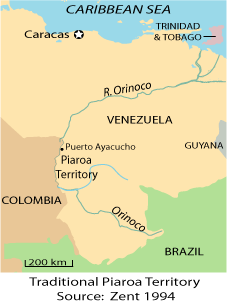Nearly 3,000 Venezuelan tribal people, including Piaroa representatives, held a large protest march in Puerto Ayacucho, the capital of Amazonas state in southern Venezuela, last Friday. The protestors expressed their opposition to the announcement by President Hugo Chávez that the New Tribes Mission (NTM), an American-based evangelical group, must be expelled from the nation.
 “This is a show of support by the tribal people of the State of Amazonas [for the NTM],” one tribal representative said. The New Tribes Mission website story of October 31 about the event includes a photo showing different Indian groups marching under their banners along a street of Puerto Ayacucho.
“This is a show of support by the tribal people of the State of Amazonas [for the NTM],” one tribal representative said. The New Tribes Mission website story of October 31 about the event includes a photo showing different Indian groups marching under their banners along a street of Puerto Ayacucho.
The protest gained international attention, particularly in the United States, where over 40 news sources around the country carried an AP dispatch on the march. A leader from the Piaroa society, Nereo Silva, was quoted as saying that “there is no proof of the accusations,” referring to the statements by President Chávez condemning the NTM. The Indian groups in southern Venezuela defend the NTM because of the aid the missionary group has provided for them over the years.
When he announced his intention to expel them on October 12, Chávez accused the NTM of “being agents of imperialist penetration,” according to news reports. “They gather sensitive and strategic information and are exploiting the Indians,” he said. He further alleged that “while indigenous people live in extremely difficult conditions, New Tribes have power plants, radio systems and airstrips well-maintained with tractors and mowers, where planes fly in from abroad without going through any kind of customs check.” The NTM denies the accusations.
Resentment against the NTM in Venezuela, a long-standing problem for them, boiled up anew on August 22 when American televangelist Pat Robertson commented on his television show “The 700 Club” that President Chávez should be assassinated. His words were that if Chávez “thinks we’re trying to assassinate him, I think that we really ought to go ahead and do it.”
Robertson later apologized for his remark, which fostered popular anger in Venezuela against American evangelists and prompted additional support for the President. Chávez captured the spirit of anger in his country by singling out the missionary group which already had a controversial history. The government quickly restricted issuing visas to foreigners.
The New Tribes Mission, an evangelical group based in Florida, has been sending missionaries abroad to preach their understanding of the Christian gospel to indigenous peoples since the 1950s. They have been working in Venezuela since 1959, and some of their activities have prompted considerable public condemnation. The controversy has played out against a background of internal Venezuelan power politics and international relations, especially with the U.S.
They became especially controversial in the 1970s when a popular, 18-minute film, “I Speak to Caracas” was issued. It featured an Indian shaman accusing the NTM of undercutting the traditional beliefs of the indigenous people of the country. “We don’t need spiritual help because we have our own religion,” he said. The film was widely shown in Venezuela and abroad, and it sparked a lot of concern about the missionaries.
The Venezuelan military became involved also in the 1970s, though for very different reasons. Several officers reported their suspicions that NTM personnel were spying for mining contractors and other foreign interests that wanted to exploit the resources of Venezuela. A couple American engineers were arrested while they were exploring along with a missionary from the NTM. A military report to the national congress that advanced a range of accusations stirred up a host of popular opposition to the missionaries. One group collected a petition with 15,000 signatures in 1979 asking the government to expel them.
The Venezuelan Congress, investigating the matter, interviewed Indian groups in Amazonas, including the Piaroa. The Evangelical community in Venezuela, which includes about 2 percent of the population, presented testimony in favor of the NTM. One Congressional deputy of the time, Jose Vicente Rangel, who pressured the government to expel the NTM, is now the vice president of the country. He still supports their expulsion, even though the order has not, as yet, been formally promulgated.
Evangelical groups are aggressively defending the NTM against the accusations. The NTM maintains that they have broken no Venezuelan laws, which they say they highly respect. “The primary concern [of NTM] is for the indigenous people of Venezuela whom our missionaries serve. In addition to religious teaching, our missionaries also minister in areas of humanitarian assistance, community development and literacy.” It is not clear, from the news reports available, how widely Nereo Silva’s opinions are shared by the rest of the Piaroa people.